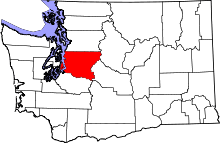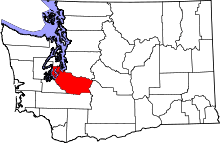Muckleshoot
| Total population | |
|---|---|
| (3,300) | |
| Regions with significant populations | |
| United States (Washington) | |
| Languages | |
| English, bəqəlšuɫucid (Muckleshoot) | |
| Related ethnic groups | |
| other Salishan peoples |
The Muckleshoot are a Lushootseed Native American tribe, part of the Coast Salish peoples of the Pacific Northwest whose traditional territory and reservations is located in the area of Auburn, Washington, about 15 miles (24 km) northeast of Tacoma and 35 miles (55 km) southeast of Seattle. As federally recognized Muckleshoot Indian Tribe (a post-Treaty construct and not a historic tribe) they are composed of descendants of various tribal groups who inhabited Central Puget Sound and occupied the Green and White River drainages from the rivers' confluence in present-day Auburn to their headwaters in the Cascades:
- the historic Buklshuhls (later known as Muckleshoot) (buklshuhls - "from a high point from which you can see", which probably referred to a lookout site between the White and Green Rivers, lived along the White River, from Kent eastwards to the mountains and eventually to the Green River)
- the Duwamish (before mid-1850s two tribes)
- Dxʷ'Dəw?Abš / Dkhw'Duw'Absh ("People of the Inside (the environs of Elliott Bay)", also known as doo-AHBSH - "People of the Doo, i.e. Inside")
- Xacuabš ("People of the Large Lake (Lake Washington)", also known as hah-choo-AHBSH - "people of HAH-choo", meaning 'a large lake', referring to present-day Lake Washington)
- the Snoqualmie (S·dukʷalbixʷ / Sduqwalbixw) (living along Tolt River and Snoqualmie River)
- Upper Puyallup (River) people: Puyallup (Spuyaləpabš or S’Puyalupubsh) bands along the Upper Puyallup River
- White River Valley tribes:[1][2]
- the Stkamish / Skekomish (Steq-ABSH) ("People of the log jam", named after the village Steq ("log jam") on the White (now Green) River in the Kent vicinity, the people of Steq were the Steq-ABSH; Settlers and government officials anglicized "Steq-ABSH" into Stkamish and applied the term to all villages between Auburn and Renton Junction, also known as White River Indians)[3]
- the Smulkamish / Smalhkamish ("People of White River", named after the term that referred to the former course of the Upper White River, they lived in villages on the present Muckleshoot Indian Reservation and near present-day Enumclaw)
- the Skopamish (Skop-ABSH / Skwohp-AHBSH) ("The People of the variable stream" or "Green ('fluctuating') River People", lived in the central Green River Valley, mostly above the former confluence near present Auburn. The term skop means "first big and then little," in apparent reference to fluctuations of the Green River; another explanation comes from the village name ill-AHL-koh ("confluence" or "striped water") at the historic confluence of the White and Green Rivers at the present-day town of Auburn, possibly from the striped appearance of the Green River below the confluence before the waters merged, also known as Green River Indians)[4]
- the Tkwakwamish / T'Qua-qua-mish (along the heads of the Puyallup River)
- the Yilalkoamish tribe
- the Dothliuk (lived in the area of South Prairie, Washington, south of the mouth of the Cole Creek into the South Prairie Creek, a Carbon River tributary)
Demographics
Traditionally, the Muckleshoots lived along the eastern shores of Washington State's Puget Sound region and the adjacent rivers of the Cascade Range. They spoke Whulshootseed, a local form of Lushootseed; most Muckleshoots today do not speak their ancestral language, but some do and the tribe has an active program for its preservation and resuscitation.
Most Muckleshoots now live on or near the 15.871 km² (6.128 sq mi) Muckleshoot Reservation on Muckleshoot Prairie, between the White and Green rivers southeast of the city of Auburn (at 47°15′43″N 122°08′45″W / 47.26194°N 122.14583°W in King County and Pierce County). With an approximate population of more than 3,000, the Muckleshoots are one of the largest Native American groups in Washington State. The 2000 census reported a resident population of 3,606 on reservation land, and 28.65 percent reported solely Native American heritage. The city of Auburn extends onto much of the reservation's land, and includes 72.6 percent of the reservation's population.
Traditional culture

Although they were skilled hunters, salmon fishing was the mainstay of traditional Muckleshoot life.[5] Salmon was gathered and cured, and very often traded with other peoples along the coast and inland. Salmon was treated with reverence, which continues to this day. In the elaborate First Salmon Ceremony, which is still observed, the entire community shares the flesh of a Spring Chinook, then returns its remains to the river where it was caught, so that it can inform the other fish of how well it was received. The other ceremony for the first salmon is to roast it until it is made to ashes. The Muckleshoot toss the bones back into the water or stream they found it in. They believed it would come alive again.
With a seemingly endless supply of food, the Muckleshoots could engage in various crafts, including weaving, wood-carving, and basket-making. A complex social structure also emerged, consisting of a nobility, middle class, and slaves, which were generally captured members of other tribes.
Colonial contact
Muckleshoot life changed radically as a result of first encounters with European and American traders and explorers. Lacking immunity to the newcomers' diseases, the population was decimated by the mid-nineteenth century. At the same time, amicable relations with American settlers deteriorated as whites began claiming choice land for themselves. In a last-ditch attempt to stem the tide of white colonization, the Muckleshoots aligned themselves with other local peoples in the Puget Sound Indian War (1855–1856). Upon their defeat, they were forced into a tiny reservation.
Recent history
Tensions abated only slightly, however, particularly in the wake of rapid population growth in the region. In the 1960s and 1970s, the Muckleshoots engaged in a series of protests,[6] intended at protecting their fragile ecosystem. Known as the Fish Wars, these protests attempted to preserve Muckleshoot fishing rights in the nearby rivers not part of the official reservation. The federal government finally conceded to the protests with the Boldt Decision, which designated the Muckleshoots as co-managers of the King County watershed, with control over fishing and hunting in their "Usual and Accustomed" historical fishing and hunting grounds.
While this improved the tribe's economic standing, the Muckleshoots were soon forced to contend with a sharp decline in the salmon population due to the effects of urbanization and industrialization on the environment. While they continue to fight for the preservation of the ancient salmon runs, the Muckleshoot also found other venues to improve their financial circumstances. Taking advantage of their proximity to Seattle and other urban centers, they opened casino and bingo parlor in Auburn, Washington called Muckleshoot Indian Casino and Muckleshoot Bingo. The earnings have also been used to reacquire lands near the reservation and lay an infrastructure for the benefit of future generations.
The Muckleshoot constitution, adopted in 1936 and ratified in 1941, determined that the tribe would be governed by a Muckleshoot Tribal Council of nine elected members. This Council is subject, in turn, to a General Council, consisting of all members of the tribe.
On November 6, 2013 KIRO-TV announced that the Muckleshoot Tribe bought 150 square miles (390 km²) of forest in Washington state.[7]
Police
The Muckleshoot Indian Tribe contracts with the King County Sheriff's Office for police services. Deputies assigned to the Muckleshoot reservation include six patrol officers, one school resource officer, and one chief assigned full-time to the reservation.
References
- ↑ http://www.wrvmuseum.org/journal/journal_0401.htm White River Valley Museum - Archaeology of the White River Valley From myth-time to contemporary time, our world has changed greatly. See two ways of telling this story of change.
- ↑ The common anglicization of the "amsh" suffix, which means "people of," resulted in many local tribes with the "mish" suffix, such as the Duwamish and Suquamish.
- ↑ Prior to its diversion in 1906, the White River split at Auburn with the primary flow of the White River joining the Green River and flowing north through Kent to Renton where it became the Duwamish River. The Green River was considered a tributary of the White River, and the reach of the river between Auburn and Renton was called the White River.
- ↑ Coast Salish Villages of Puget Sound
- ↑ Johansen, Bruce E (2015). Up from the ashes: nation building at Muckleshoot (1st ed.). Seattle, WA: Seattle Publishing. ISBN 978-0-9857764-1-1.
- ↑ Roger S. Powers et. al., ed. (12 November 2012). Protest, Power, and Change: An Encyclopedia of Nonviolent Action from ACT-UP to Women's Suffrage. Routledge. p. 342. ISBN 978-1-136-76482-0.
- ↑ "Muckleshoot Tribe buys 150 square miles of forest". The Daily Herald. November 7, 2013. Retrieved 16 February 2015.
Further reading
- Johansen, Bruce E (2015). Up from the ashes: nation building at Muckleshoot (1st ed.). Seattle, WA: Seattle Publishing. ISBN 978-0-9857764-1-1.
External links
- Muckleshoot Tribe website
- Muckleshoot Casino
- Danny Westneat (July 26, 1995). "Business - Muckleshoot Tribe Rises From Ashes Of 1970 Fire". Seattle Times Newspaper. Retrieved 16 February 2015.

